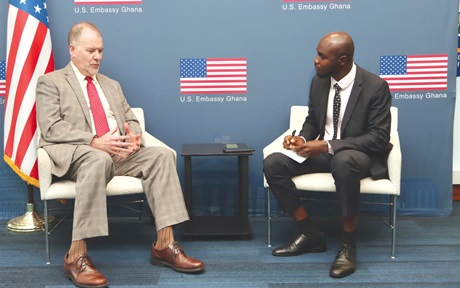The new visa validity schedule announced by the US State Department for non-immigrant visas (B-1, B-2) does not represent the length of stay in the US by holders, the Chargé d’Affaires at the US Embassy, Rolf Olson, has clarified.
In an exclusive interview with the Daily Graphic at the US Embassy in Accra, the Chargé d’ Affaires said the new visa policy, which revised the non-immigrant visa status from five years multiple entries to three months single entry, meant that Ghanaians issued with those visas had within three months to travel to the US.
This also implies that any of the non-immigrant visas granted to any Ghanaian becomes invalid if he or she, upon receiving the visa, fails to travel to the US within the stated period, according to the new policy, Mr Olson explained.
“The three-month period is how long you have to enter the United States. It's not about how long you have to stay in the United States, and that's a common misperception.
“Understandably, all these can be quite confusing. So, for example, today is July 9.
If you were issued a visa today, it would expire on October 8 or 9, whatever three months is,” he said.
Length of stay, old visas
Mr Olson, however, said that the length of stay in the US by the visa holders would be determined by the Customs and Border Protection (CBP) officers when they arrived at the entry points of the US.
More specifically, on B-1 and B-2 visas issued to tourists, visitors and for business purposes, he said the six-month standard period was not automatic, as the CBP officers always had the right to shorten or lengthen it.
Also, for the student visa (F-1) holders, he explained that the CBP officers, upon arrival in the US, would issue the students with these types of visas a stay period in the US which would cover their entire study duration in the US.
The Chargé d’Affaires further explained that Ghanaians with old visas were not affected by the new visa validity schedule.
“Anybody who already has a visa, there's no change to the status of that visa. If you have a five-year multiple-entry or three years multiple entry, whatever the status is, the current visa does not change. This is only about issuances of new visas going forward for the time being,” he clarified.
Motive, criteria
Mr Olson indicated that the reciprocity visa validity schedule was a strategic decision to enhance fraud detection and prevention.
“The visa validity schedule was changed for several other countries all around the world because we believe that it is easier for us to detect and prevent fraud when we have shorter visa validities,” he explained.
The American diplomat emphasised that the revised visa status did not single out Ghana, but cut across several countries across the globe, adding that the new policy had not changed the eligibility criteria for the visas.
“There's been no change to the eligibility criteria in terms of who can qualify for a given visa, whether it's a tourist visa or a student visa.
What has been changed is what's called the reciprocity schedule, and it's for the various visa categories.
“There are many; some of them are relatively obscure. It shows the maximum validity of a visa that can be issued for that category at any given time,” he stated.
The Chargé d’ Affaires emphasised that the visa validity schedule for Ghana and other countries evolved and was constantly assessed and adjusted from time to time, as it was not static for any given period.
Visa overstays
Mr Olson expressed appreciation for the government's position, particularly comments made by the Foreign Minister, Samuel Okudzeto Ablakwa, on the visa overstay by 21 per cent of Ghanaian students in the US, which is higher than the 15 per cent threshold considered by the US government.
He said the embassy had been engaging with the Ghanaian authorities on issues related to immigration, including visa overstays, adding that the US was exploring ways to collaborate with Ghana to address these issues.
He stressed the importance of Ghanaian citizens respecting immigration laws, stating that every country had the right to enforce its regulations.
He emphasised that the US had granted visas to millions of people but struggled with a significant number of individuals staying in the country without legal status.
The Chargé d’Affaires underscored the national security implications of visa adjudications, describing each decision as a national security issue and a fulfilment of a policy the US President campaigned on.

